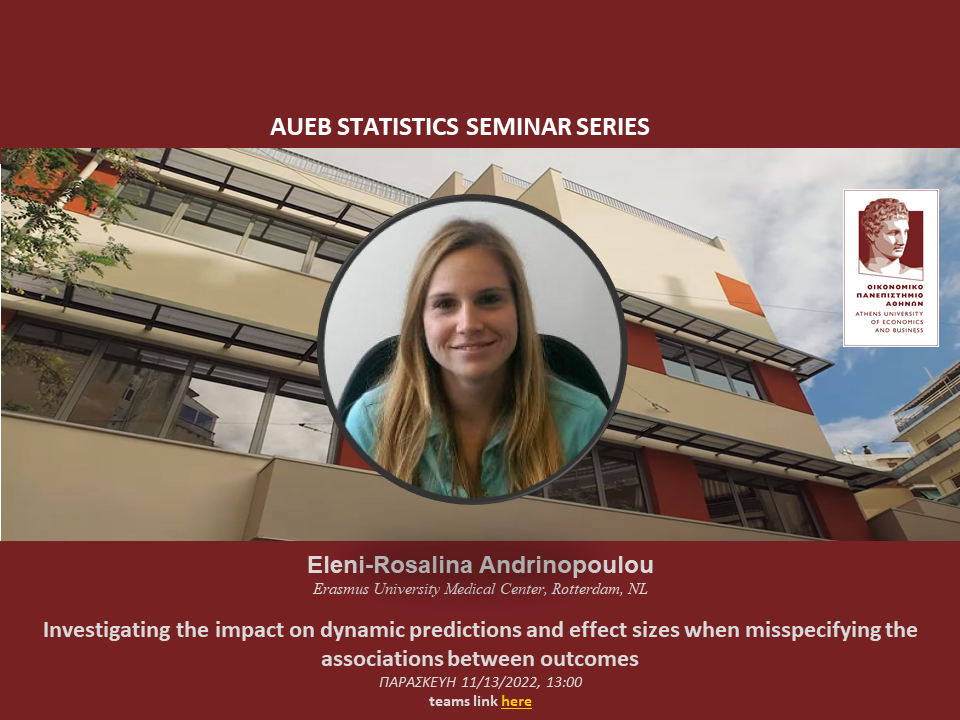 AUEB Stats Seminars 11/3/2022: Investigating the impact on dynamic predictions and effect sizes when misspecifying the associations between outcomes
AUEB Stats Seminars 11/3/2022: Investigating the impact on dynamic predictions and effect sizes when misspecifying the associations between outcomes
Thu 10 Mar 2022 - 11:25

AUEB-Stats Seminars
Friday, March 11, 2022, 13:00
Presenter: Eleni-Rosalina Andrinopoulou (Erasmus University Medical Center, Rotterdam)
Investigating the impact on dynamic predictions and effect sizes when misspecifying the associations between outcomes
ABSTRACT:
The increasing availability of clinical measures (e.g., electronic medical records) leads to collecting many different types of information. This information mainly includes multiple longitudinal measurements collected during follow-up visits of the patient to the clinic. Big data is the key element to new developments and precision medicine. Nowadays, individualized, dynamic predictions are popular in different medical fields because they improve patient care. In particular, it is of high clinical interest to predict future measurements to assess recovery on patients who experienced a stroke or predict life expectancy for patients with Cystic Fibrosis.
Physicians collect a variety of measurements over time to assess the severity and progression of a disease. Even though all outcomes will be considered together intuitively, they will usually be analyzed separately. It is biologically relevant to study them together; therefore, it is more appropriate to analyze them assuming a single statistical model. This, however, poses many challenges. In particular, different characteristics of the patients' longitudinal profiles could influence the outcome(s) of interest. For example, the rate of change could be a better predictor than the actual value. Therefore, it is essential to assume the correct association structure when obtaining dynamic predictions.
Using an extensive simulation study, we investigate the impact of misspecifying (or ignoring) the association between the outcomes. We focus on predictions and effect sizes obtained from a misspecified model. We expect to improve the individualized predictions when incorporating multiple outcomes and appropriately modelling their associations. In particular, we aim to strengthen previously developed (and frequently used by clinicians) prediction models (examples can be found here https://emcbiostatistics.shinyapps.io/LongitudinalMixtureModelFMUE/, https://emcbiostatistics.shinyapps.io/DynamicPredictionARATapp/). In this new era of rich medical data sets, it is often challenging to combine all the available data effectively.
Teams Link here
- AUEB Stats Seminars 14/12/2022: A new non-parametric Cross-Spectrum Estimator by Evanggelos Ioannidis (Department of Statistics, AUEB)
- AUEB STATS SEMINARS 3/10/2018: A dynamic binomial model with application to the propensity to use tax amnesty by Jonas Andersson
- AUEB STATS SEMINARS 4/5/2017: Dynamic borrowing through empirical power priors that control type I error
- AUEB Stats Seminars 2/11/2022: Non-linear Network Autoregression by K. Fokianos (University of Cyprus)
- AUEB Stats Seminars 25/2/2022: Subset selection for big data regression: an improved approach
Permissions in this forum:
You cannot reply to topics in this forum

 Grstats
Grstats
